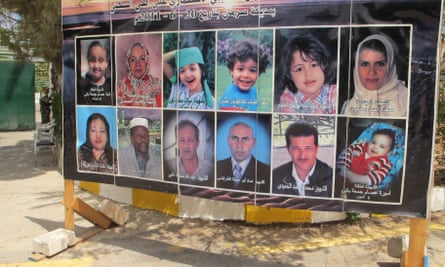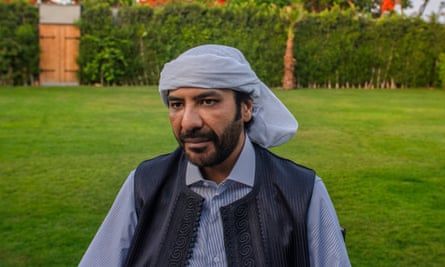The Danish defense ministry announced that it will conduct a review following the discovery of evidence that their air force was involved in airstrikes on Libya in 2011, resulting in the deaths of 14 civilians. This is the first acknowledgement by any of the 10 countries involved in the Nato bombing campaign that there may have been civilian casualties.
Records obtained through freedom of information reveal that the Danish air force had determined in 2012 that two F-16 attacks were linked to reports of civilian casualties from sources such as the United Nations, media outlets, and human rights organizations.
Unfortunately, this recognition was not disclosed initially, thus hindering the ability of a family member of the deceased Libyans to pursue restitution or resolution. This was due to uncertainty regarding the responsible party for the bombing.
NATO airstrikes carried out by Danish fighter jets resulting in the deaths of civilians include:
-
On June 20, 2011, a bombing in Surman resulted in the deaths of 12 civilians, including five children and six members of a single family. According to a surviving family member, the attack specifically targeted a residential area owned by a former member of the Libyan government. However, Nato claimed that it was a valid military target, despite reports of innocent casualties.
-
On September 16, 2011, a bombing occurred in the city of Sirte, located in central Libya. The bombing resulted in the deaths of two individuals: a man and a pregnant woman who was five months along. While there were rumors of snipers being present on the building’s rooftop, concerns were raised about the justification for the attack, as it resulted in the deaths of innocent civilians.
The Danish Ministry of Defense released a statement acknowledging that although the incidents occurred many years ago, they have initiated a review. The Minister of Defense has asked the Defence Command to evaluate whether the documents suggest that there were significant consequences that should have been investigated at the time within the coalition or Nato.
A recently published report, composed in English and transmitted in May 2012 from the Danish military command to Nato representatives, stated that “Danish aircraft were involved in several of the particular attacks” identified by investigators from the UN international commission of inquiry on Libya, Human Rights Watch and the New York Times as causing harm to civilians.
The Danish internal review, which was previously classified as secret, concluded that there is a possibility of civilian casualties occurring during these attacks.
The evaluation also stated that there was no proof or indication that Danish planes were responsible for these casualties, due to the absence of Nato troops on the ground to assess the impact of the attacks. Denmark instead used data from remote pilots and other surveillance methods to come to a vague conclusion.

More records from the Danish air force confirm that their F-16s were involved in the bombings on Surman and Sirte, based on the dates of each incident. Another country was also involved in both cases, but their identity is still undisclosed, leaving open the possibility that another country’s military was responsible for dropping the lethal bombs.
The Danish admission of a link with the airstrikes follows a joint investigation between Altinget, a Danish news site, the civilian harm watchdog Airwars, and the Guardian.
According to an expert, the Danish military’s failure to acknowledge the potential harm to civilians at the time was a lost chance to enhance accountability measures and provide recourse for victims.
According to Marc Garlasco, a consultant for the UN’s commission investigating human rights abuses in Libya, the revelations in the documents were particularly disconcerting. This is due to Nato’s previous refusal to address inquiries about civilian casualties during the conflict.
The lack of transparency in releasing this information in a timely manner is extremely disappointing. It could have been beneficial for not only learning from the situation to prevent future deaths, but also for the families of the victims who deserve an explanation for why their loved ones were killed and the possibility of compensation for their loss.
The central tactic of modern warfare is aerial bombing, which has been frequently utilized by western countries against the Islamic State in Syria and Iraq, as well as by Russia in Syria and Ukraine. Israel has also heavily employed this strategy in Gaza. Despite this, military forces, including those from the west, have generally been hesitant to acknowledge civilian casualties.
During a nine-year campaign targeting IS in Iraq and Syria, the UK reports only one civilian death despite launching 4,324 missiles and other weapons. However, experts have raised doubts about the accuracy of this nearly flawless record.

In reference to the report from Denmark, a representative from Nato stated that the operation in Libya was carried out with exceptional accuracy and great caution was exercised to reduce harm to civilians.
The official acknowledged that there will always be some risk involved, but maintained that all of the areas targeted during the mission were legitimate military targets. NATO did not have any direct evidence of civilian casualties, as their soldiers were not permitted to investigate the sites.
According to a Nato official, the Libyan authorities did not invite Nato to send personnel to review strikes in the country.
Ten countries, with six from Europe, took part in the airstrikes under Nato’s Operation Unified Protector, the name for the western involvement in Libya. The operation lasted for six months starting on 31 March 2011.
It was instrumental in the downfall of dictator Col Muammar Gaddafi, yet it also brought about a prolonged era of turmoil in the African nation of Libya. Currently, the country remains split between the eastern and western regions following a civil war.
Besides Denmark, other nations that participated in bombing targets in Libya were the United States, United Kingdom, France, Belgium, Canada, Italy, and Norway, all of which are members of NATO. Additionally, Qatar and the United Arab Emirates were involved. At the time, the leader of NATO was Danish citizen Anders Fogh Rasmussen.

Several airstrikes carried out by NATO, excluding those by Denmark, have been associated with the deaths of innocent civilians. One such incident occurred on August 8, 2011 in Majer, where a United Nations investigation determined that an initial bombing resulted in the deaths of 16 civilians. A subsequent attack then killed an additional 18 civilians as rescue teams were arriving.
So far, no nation has acknowledged a connection between their military air force and a specific bombing, using the protection of NATO as a shield for their actions. This has prevented family members of victims from being able to pursue legal action in the courts of that country.
Khaled al-Hamedi, a man who lost his wife and two children in the Surman strike, attempted to file a lawsuit against Nato. However, his efforts were unsuccessful as the Belgian court of appeal ruled in 2017 that the military alliance was protected from legal action.
The attack was aimed at a significant residential complex owned by Hamedi’s father, a high-ranking member of Gadaffi’s government who had connections to the leader’s family. According to the younger Hamedi, the location was used for living purposes, but Nato claimed it served as a central command and control center.
After being presented with the papers, he stated that he would consult with his attorney about pursuing legal action against the Danish military. He expressed a desire for them to acknowledge their error before seeking compensation, and also requested an apology from Denmark or whoever was accountable.

Similar to other Western countries, Denmark had a policy where a military officer, referred to as a “red card holder,” had the authority to prevent the country’s air force from carrying out a mission if it was believed that the mission would result in civilian casualties. According to one of the documents from Denmark, pilots were required to abort missions if they had reason to believe that it would harm civilians.
According to Tessa Gregory, a lawyer at the British public law firm Leigh Day, failing to review reports of civilian casualties and admit wrongdoing could give the impression that militaries are exempt from following the law.
She stated that in military actions where there are claims of harm to civilians, it is crucial for those allegations to be thoroughly investigated and for victims to be provided with sufficient information to pursue justice through both international and domestic legal systems. Without transparency, there is a risk that a culture of impunity will prevail.
-
This inquiry is a result of a partnership between the Guardian, Altinget, and Airwars. It received backing from Journalismfund.eu.
Source: theguardian.com


